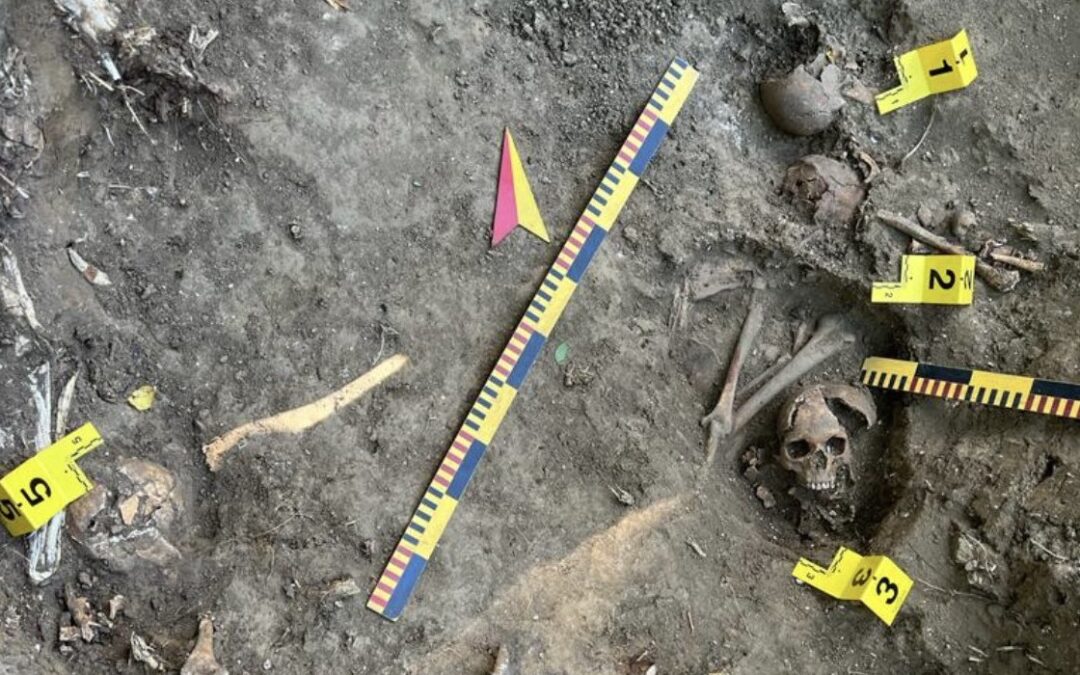Poland’s government has announced the discovery of a mass burial pit in Ukraine containing the remains of ethnic Poles murdered by Ukrainian nationalists during a series of massacres in World War Two. It is the first time in nine years that such a discovery has been made.
The Polish authorities will now seek permission to exhume the remains. However, exhumations of victims of the massacres have been blocked by Ukraine in recent years, with the issue becoming a source of tension between the two countries.
“It's hard to imagine” Ukraine joining the EU without first allowing the exhumation of ethnic Poles massacred by Ukrainian nationalists in WWII, says a Polish deputy foreign minister.
The issue has often caused tension between two otherwise close allies https://t.co/5zM5uL6pEd
— Notes from Poland 🇵🇱 (@notesfrompoland) June 20, 2023
The finding was announced today by two members of the government, deputy prime minister Piotr Gliński, who also serves as culture minister, and Michał Dworczyk, a minister without portfolio.
“After four months of difficult searches for the remains of Poles – victims of Ukrainian nationalists – Polish and Ukrainian specialists found a mass pit in which the bodies of murdered villagers were placed in 1945,” wrote Dworczyk on X, alongside an image of some of the remains.
He noted that the remains were found in what was once the ethnic-Polish village of Puźniki (Puzhnyky in Ukrainian) but whose inhabitants were murdered by the Ukrainian Insurgent Army (UPA) in the course of one night in February 1945. Around 70 civilians were killed and their houses were burned down.
W byłej miejscowości Puźniki (rejon Czortków, obwód Tarnopolski na Ukrainie) specjaliści polscy i ukraińscy, po czterech miesiącach trudnych poszukiwań szczątków Polaków, ofiar ukraińskich nacjonalistów, odnaleźli zbiorowy dół, w którym w 1945 r. złożono ciała pomordowanych… pic.twitter.com/xDtKYzlaVA
— Michał Dworczyk (@michaldworczyk) October 27, 2023
The incident was one of countless that took place between 1943 and 1945, in what are known as the Volhynia massacres. Ukrainian nationalists killed tens of thousands of ethnic Poles – mostly women and children – as well as Jews and other non-Ukrainian ethnic groups.
The massacres took place in Nazi-German-occupied areas that had been part of Poland before the war, but most of which were transferred to Ukraine as part of the postwar settlement.
Poland regards them as a genocide – and has officially recognised them as such – but Ukraine has disputed the use of that term. The issue has regularly caused tension between Warsaw and Kyiv, who have otherwise been close allies since Russia’s invasion of Ukraine.
A Polish government minister has launched a bid to extradite the 98-year-old Ukrainian Canadian who received a standing ovation in Canada’s parliament.
Yaroslav Hunka served in a German Nazi unit that was involved in war crimes against Poles and Jews https://t.co/dQOHwWngpc
— Notes from Poland 🇵🇱 (@notesfrompoland) September 26, 2023
Both Gliński and Dworczyk noted that the discovery in Puźniki is the first such find in nine years. Dworczyk revealed that the search team included archaeologists and anthropologists from the Pomeranian Medical University, representatives of Poland’s Institute of National Remembrance (IPN), and Ukrainian archaeologists.
He added that permits to search in the area had been obtained with the support of Poland’s President Andrzej Duda and Prime Minister Mateusz Morawiecki, who visited the site in July this year.
“In accordance with applicable regulations, the relevant Ukrainian authorities have been requested to consent to exhumation and a dignified burial” of the remains, added Dworczyk.
Last year, Poland announced that the Ukrainian authorities had given consent to conduct exploration work in Puźniki. The Polish foreign ministry hailed it as “a step in a very good direction”.
Poland’s prime minister says he has received personal assurances from @ZelenskyyUa that Ukraine will permit the exhumation of victims of the Volhynia massacres, in which Ukrainian nationalists killed tens of thousands of ethnic Poles during WWII https://t.co/gJI3YntsHg
— Notes from Poland 🇵🇱 (@notesfrompoland) March 14, 2023
In 2017, the Ukrainian authorities had banned the search for and exhumation of the remains of Polish victims of wars and conflicts on Ukrainian territory. The decision was made after the dismantling of a UPA monument in Poland in April that year.
But in 2020, Ukrainian President Volodymyr Zelensky and his Polish counterpart, Duda, jointly declared a desire to “respect historical truth”, including allowing the exhumation of victims.
Earlier this year, Morawiecki said he had received personal assurances from Zelensky that Ukraine will permit the exhumation of victims of the Volhynia massacres.
In what was seen as a landmark moment, in July, Zelensky and Duda jointly attended a commemoration marking the 80th anniversary of the massacres. Previously, the chairman of Ukraine’s parliament had expressed sympathy for the pain felt by Poles over the massacres.
In an important symbolic moment, the presidents of Ukraine and Poland have jointly marked the anniversary of the WWII Volhynia massacres, in which Ukrainians killed up to 100,000 Poles.
The issue has often caused tension between two otherwise close allies https://t.co/nwJOJU6A6y
— Notes from Poland 🇵🇱 (@notesfrompoland) July 9, 2023

Notes from Poland is run by a small editorial team and published by an independent, non-profit foundation that is funded through donations from our readers. We cannot do what we do without your support.
Main image credit: Michał Dworczyk/Twitter

Daniel Tilles is editor-in-chief of Notes from Poland. He has written on Polish affairs for a wide range of publications, including Foreign Policy, POLITICO Europe, EUobserver and Dziennik Gazeta Prawna.



















